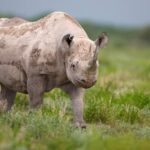Fake It: WFU Professor Discusses Development of Synthetic Rhino Horns

Wake Forest University Associate Professor of Economics Frederick Chen recently published an article titled, “Fake It ‘Til the Rhinos Make It?” on The Huffington Post. The piece discusses the development of synthetic rhino horns and their potential effects on […]

